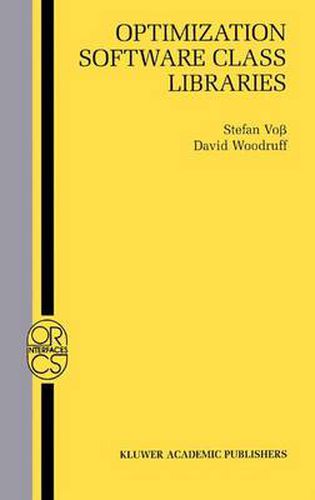Readings Newsletter
Become a Readings Member to make your shopping experience even easier.
Sign in or sign up for free!
You’re not far away from qualifying for FREE standard shipping within Australia
You’ve qualified for FREE standard shipping within Australia
The cart is loading…






This title is printed to order. This book may have been self-published. If so, we cannot guarantee the quality of the content. In the main most books will have gone through the editing process however some may not. We therefore suggest that you be aware of this before ordering this book. If in doubt check either the author or publisher’s details as we are unable to accept any returns unless they are faulty. Please contact us if you have any questions.
Optimization problems in practice are diverse and evolve over time, giving rise to - quirements both for ready-to-use optimization software packages and for optimization software libraries, which provide more or less adaptable building blocks for app- cation-specific software systems. In order to apply optimization methods to a new type of problem, corresponding models and algorithms have to be coded so that they are accessible to a computer. One way to achieve this step is the use of a mod- ing language. Such modeling systems provide an excellent interface between models and solvers, but only for a limited range of model types (in some cases, for example, linear) due, in part, to limitations imposed by the solvers. Furthermore, while m- eling systems especially for heuristic search are an active research topic, it is still an open question as to whether such an approach may be generally successful. Modeling languages treat the solvers as a black box with numerous controls. Due to variations, for example, with respect to the pursued objective or specific problem properties, - dressing real-world problems often requires special purpose methods. Thus, we are faced with the difficulty of efficiently adapting and applying appropriate methods to these problems. Optimization software libraries are intended to make it relatively easy and cost effective to incorporate advanced planning methods in application-specific software systems. A general classification provides a distinction between callable packages, nume- cal libraries, and component libraries.
$9.00 standard shipping within Australia
FREE standard shipping within Australia for orders over $100.00
Express & International shipping calculated at checkout
This title is printed to order. This book may have been self-published. If so, we cannot guarantee the quality of the content. In the main most books will have gone through the editing process however some may not. We therefore suggest that you be aware of this before ordering this book. If in doubt check either the author or publisher’s details as we are unable to accept any returns unless they are faulty. Please contact us if you have any questions.
Optimization problems in practice are diverse and evolve over time, giving rise to - quirements both for ready-to-use optimization software packages and for optimization software libraries, which provide more or less adaptable building blocks for app- cation-specific software systems. In order to apply optimization methods to a new type of problem, corresponding models and algorithms have to be coded so that they are accessible to a computer. One way to achieve this step is the use of a mod- ing language. Such modeling systems provide an excellent interface between models and solvers, but only for a limited range of model types (in some cases, for example, linear) due, in part, to limitations imposed by the solvers. Furthermore, while m- eling systems especially for heuristic search are an active research topic, it is still an open question as to whether such an approach may be generally successful. Modeling languages treat the solvers as a black box with numerous controls. Due to variations, for example, with respect to the pursued objective or specific problem properties, - dressing real-world problems often requires special purpose methods. Thus, we are faced with the difficulty of efficiently adapting and applying appropriate methods to these problems. Optimization software libraries are intended to make it relatively easy and cost effective to incorporate advanced planning methods in application-specific software systems. A general classification provides a distinction between callable packages, nume- cal libraries, and component libraries.